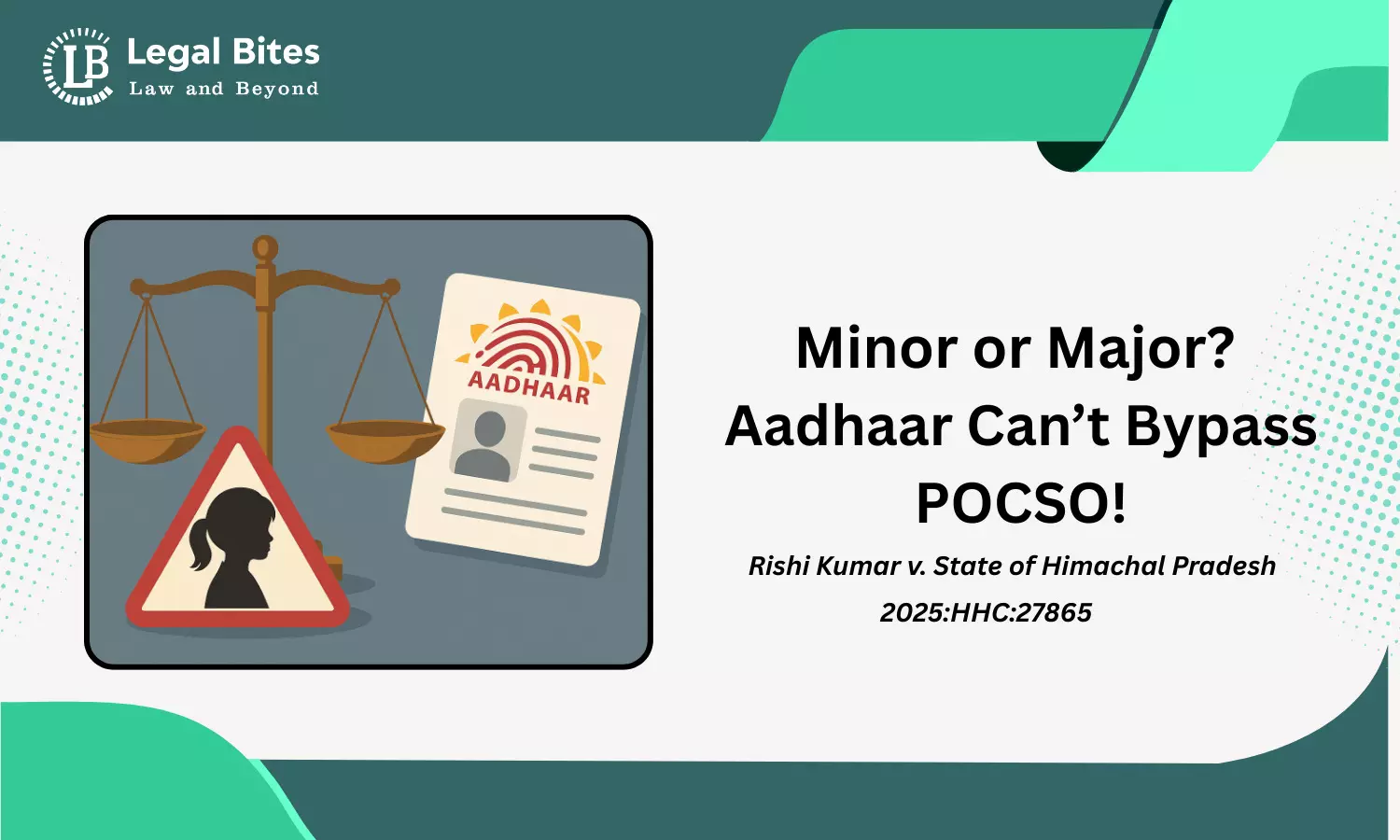
The Protection of Children from Sexual Offences Act, 2012 (POCSO Act) was enacted to protect children under the age of 18 from sexual assault, harassment, and exploitation. One of the recurring issues in POCSO trials is whether the age recorded in an Aadhaar card—sometimes showing that the victim is a major—can nullify the prosecution. The Himachal Pradesh High Court in Rishi Kumar v. State of Himachal Pradesh (2025:HHC:27865) clarified that Aadhaar cannot be treated as conclusive proof of age, and therefore, cannot be relied upon to defeat charges under POCSO.
Factual Background
In Rishi Kumar, the petitioner was accused of kidnapping and raping a minor girl, with offences registered under Sections 363, 376 IPC and Section 4 POCSO Act.
- The victim’s father alleged she was born on 04.08.2007, making her 16 years and 9 months old on the date of the incident (19.05.2024).
- The petitioner argued that the victim had voluntarily eloped with him and carried her Aadhaar card, which recorded her date of birth as 01.01.2005, making her a major (19 years old).
- Forensic DNA analysis confirmed sexual intercourse.
- The accused claimed he reasonably believed the victim was above 18.
The High Court dismissed the bail plea, ruling that Aadhaar cannot determine age and that the minority was proved through other records.
Legal Framework
1. POCSO Act, 2012
Section 2(1)(d): “Child” means any person below 18 years.
Section 4: Punishes penetrative sexual assault against a child.
Section 29 & 30: Presume guilt and culpable mental state of accused.
2. Juvenile Justice (Care and Protection of Children) Act, 2015
Section 94: Age is determined by hierarchy—school/matriculation certificate, municipal birth certificate, or medical opinion. Aadhaar is not included.
Judicial Approach: Aadhaar
Supreme Court
Saroj v. Iffco-Tokio General Insurance Co. (2024): Held that an Aadhaar card is not proof of date of birth.
High Courts
- Manoj Kumar Yadav v. State of M.P. (2023): Aadhaar cannot prove juvenility.
- Navdeep Singh v. State of Punjab (2021): Aadhaar is not “firm proof of age.”
- Kumit Kumar v. State of H.P. (2024): Birth records prevail over Aadhaar.
Thus, Aadhaar may establish identity but not age.
Reasoning of the Himachal Pradesh High Court
Justice Rakesh Kainthla held:
- Aadhaar is not a valid proof – Following Saroj, Aadhaar cannot determine age.
- Minority proved – Victim’s actual birth date (04.08.2007) established by records, making her a minor.
- Consent irrelevant – Even if the victim misrepresented herself as an adult, POCSO treats minors as incapable of consent.
- Strict liability principle – Following Reg. v. Prince (1875), belief in the majority is no defence.
- Forensic link – DNA evidence connected the accused to the offence.
Hence, bail was denied
Comparative Jurisprudence
- UK (Reg. v. Prince, 1875): Mistake of age is no defence.
- UK Sexual Offences Act, 2003: Children under 13 deemed incapable of consent.
- Canada (R v. Hess, 1990): Strict liability imposed even if accused believed victim was older.
India follows similar strict liability under POCSO.
Constitutional Dimensions
- Article 21: Liberty of accused subject to restriction to protect minors.
- Article 15(3): Allows special laws for children.
Thus, POCSO’s strict liability framework is constitutionally justified.
Practical Implications
- For the accused: Cannot rely on Aadhaar; must contest birth certificates or medical records.
- For police: Must collect reliable age documents.
- For courts: Aadhaar not admissible for age determination.
- For society: Reinforces child protection even in cases of consensual adolescent relationships.
Criticisms
- Some argue that strict liability can criminalise consensual teenage relationships.
- Aadhaar discrepancies sometimes create genuine confusion.
- Yet, courts prioritise the protection of children over the accused’s perception.
Conclusion
The Himachal Pradesh High Court has clarified beyond doubt that an Aadhaar card showing majority does not nullify POCSO charges. Age must be proved through birth or school records under the JJ Act, not Aadhaar. Once a minority is established, consent or misrepresentation is irrelevant, and strict liability applies.
This ensures that the POCSO Act remains a strong safeguard for children, aligned with constitutional protections and international standards.
Important Link
Law Library: Notes and Study Material for LLB, LLM, Judiciary, and Entrance Exams